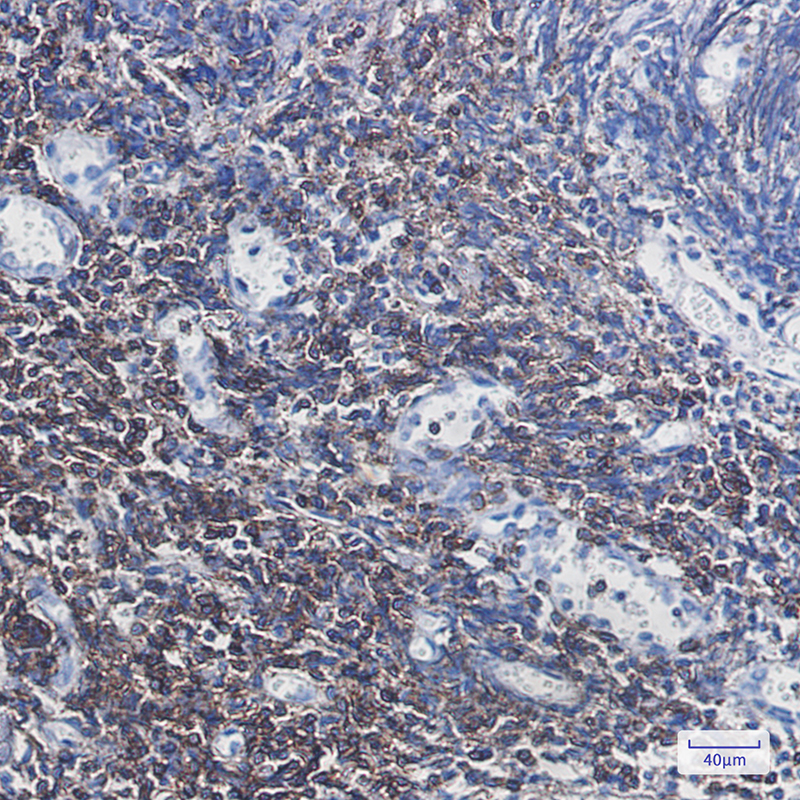

| WB | 咨询技术 | Human,Mouse,Rat |
| IF | 1/20 | Human,Mouse,Rat |
| IHC | 1/50-1/100 | Human,Mouse,Rat |
| ICC | 技术咨询 | Human,Mouse,Rat |
| FCM | 咨询技术 | Human,Mouse,Rat |
| Elisa | 咨询技术 | Human,Mouse,Rat |
| Aliases | CD3 gamma; CD3g; T3G |
| Entrez GeneID | 917 |
| WB Predicted band size | Calculated MW: 20 kDa; Observed MW: 20 kDa |
| Host/Isotype | Rabbit IgG |
| Antibody Type | Primary antibody |
| Storage | Store at 4°C short term. Aliquot and store at -20°C long term. Avoid freeze/thaw cycles. |
| Species Reactivity | Human |
| Immunogen | A synthetic peptide of human CD3G |
| Formulation | Purified antibody in TBS with 0.05% sodium azide,0.05%BSA and 50% glycerol. |
+ +
以下是关于CD3G抗体的参考文献示例(注:以下内容为模拟示例,建议通过学术数据库查询真实文献):
---
1. **文献名称**:**"CD3γ chain expression in T cell development and its role in TCR signaling"**
**作者**:Miller, R. et al.
**摘要**:本研究利用特异性抗CD3G抗体,分析CD3γ链在T细胞发育不同阶段的表达变化,揭示其在TCR信号传导中的关键作用。实验表明,CD3G缺失导致胸腺细胞成熟障碍,并影响下游ZAP-70激酶活化。
2. **文献名称**:**"A novel anti-CD3G monoclonal antibody modulates T cell activation in autoimmune models"**
**作者**:Chen, L. et al.
**摘要**:开发了一种靶向CD3G表位的单克隆抗体,通过体外实验和小鼠模型验证其免疫调节功能。该抗体选择性地抑制过度活跃的T细胞反应,为自身免疫性疾病(如类风湿性关节炎)提供了潜在治疗策略。
3. **文献名称**:**"Structural insights into CD3γ/ε heterodimer recognition by therapeutic antibodies"**
**作者**:Wang, Y. et al.
**摘要**:通过冷冻电镜技术解析抗CD3G抗体与CD3γ/ε异二聚体的结合模式,阐明其空间构象对T细胞激活的影响。研究为优化T细胞导向疗法(如双特异性抗体)提供了分子基础。
4. **文献名称**:**"CD3G mutations identified in immunodeficiency patients impair surface TCR expression"**
**作者**:Garcia, S. et al.
**摘要**:在严重联合免疫缺陷(SCID)患者中发现CD3G基因突变,通过流式细胞术结合抗CD3G抗体检测,证实突变导致T细胞表面TCR-CD3复合体表达缺陷,进而引发免疫功能异常。
---
**建议**:如需具体文献,可检索PubMed、Web of Science等平台,使用关键词“CD3G antibody”或“CD3 gamma chain”筛选近年研究。
The CD3G antibody targets the CD3 gamma (γ) chain, a critical component of the T-cell receptor (TCR) complex. Found on the surface of T lymphocytes, the TCR-CD3 complex consists of antigen-binding subunits (α/β or γ/δ) paired with invariant CD3 subunits (γ, δ, ε, and ζ). CD3G encodes the γ subunit, which plays a pivotal role in TCR assembly, surface expression, and signal transduction. Upon antigen recognition, CD3G participates in transmitting activation signals through immunoreceptor tyrosine-based activation motifs (ITAMs), initiating downstream pathways that drive T-cell proliferation, differentiation, and effector functions.
CD3G antibodies are widely used in research to study T-cell biology, immune regulation, and diseases like autoimmune disorders and cancers. In therapeutics, anti-CD3 antibodies (e.g., otelixizumab, teplizumab) historically targeted the CD3ε subunit to modulate T-cell activity, showing efficacy in autoimmune diabetes and transplant rejection. However, CD3G-specific antibodies have gained attention for their potential in refining immunotherapy approaches. For example, bispecific antibodies engaging CD3G and tumor antigens redirect T cells to kill cancer cells, a strategy explored in hematologic malignancies.
Recent studies also investigate CD3G's role in T-cell exhaustion and checkpoint inhibitor resistance. Challenges remain in minimizing cytokine release syndrome and off-target effects. Advances in antibody engineering, such as Fc domain optimization or affinity tuning, aim to enhance specificity and safety. Overall, CD3G antibodies remain vital tools for dissecting TCR signaling and developing next-generation immunotherapies.
×